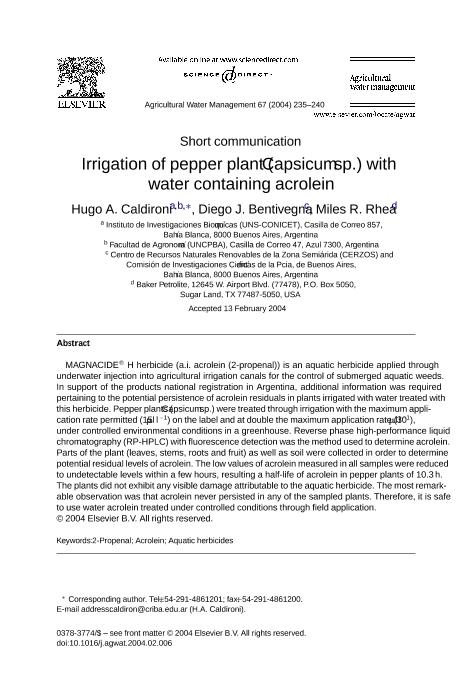Artículo
Irrigation of pepper plant (Capsicum sp.) with water containing acrolein
Fecha de publicación:
01/07/2004
Editorial:
Elsevier Science
Revista:
Agricultural Water Management
ISSN:
0378-3774
Idioma:
Inglés
Tipo de recurso:
Artículo publicado
Clasificación temática:
Resumen
MAGNACIDE® H herbicide (a.i. acrolein (2-propenal)) is an aquatic herbicide applied through underwater injection into agricultural irrigation canals for the control of submerged aquatic weeds. In support of the products national registration in Argentina, additional information was required pertaining to the potential persistence of acrolein residuals in plants irrigated with water treated with this herbicide. Pepper plants (Capsicum sp.) were treated through irrigation with the maximum application rate permitted (15 μl l-1) on the label and at double the maximum application rate (30 μl l-1), under controlled environmental conditions in a greenhouse. Reverse phase high-performance liquid chromatography (RP-HPLC) with fluorescence detection was the method used to determine acrolein. Parts of the plant (leaves, stems, roots and fruit) as well as soil were collected in order to determine potential residual levels of acrolein. The low values of acrolein measured in all samples were reduced to undetectable levels within a few hours, resulting a half-life of acrolein in pepper plants of 10.3 h. The plants did not exhibit any visible damage attributable to the aquatic herbicide. The most remarkable observation was that acrolein never persisted in any of the sampled plants. Therefore, it is safe to use water acrolein treated under controlled conditions through field application.
Palabras clave:
2-Propenal
,
Acrolein
,
Aquatic Herbicides
Archivos asociados
Licencia
Identificadores
Colecciones
Articulos(CERZOS)
Articulos de CENTRO REC.NAT.RENOVABLES DE ZONA SEMIARIDA(I)
Articulos de CENTRO REC.NAT.RENOVABLES DE ZONA SEMIARIDA(I)
Articulos(INIBIBB)
Articulos de INST.DE INVEST.BIOQUIMICAS BAHIA BLANCA (I)
Articulos de INST.DE INVEST.BIOQUIMICAS BAHIA BLANCA (I)
Citación
Caldironi, Hugo Alfredo; Bentivegna, Diego Javier; Rhea, Miles R.; Irrigation of pepper plant (Capsicum sp.) with water containing acrolein; Elsevier Science; Agricultural Water Management; 67; 3; 1-7-2004; 235-240
Compartir
Altmétricas




